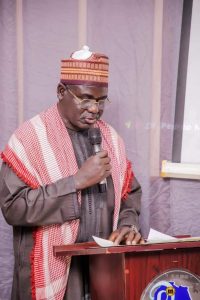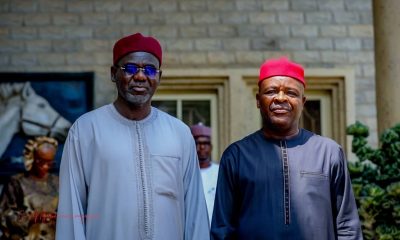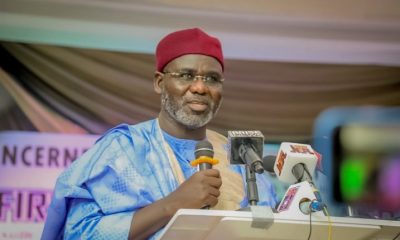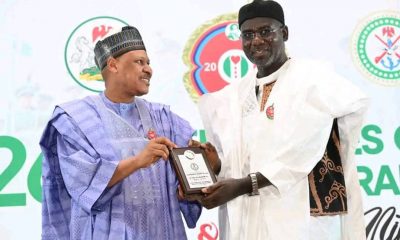Opinion
Gen. Buratai And His Sense Of Nationalism
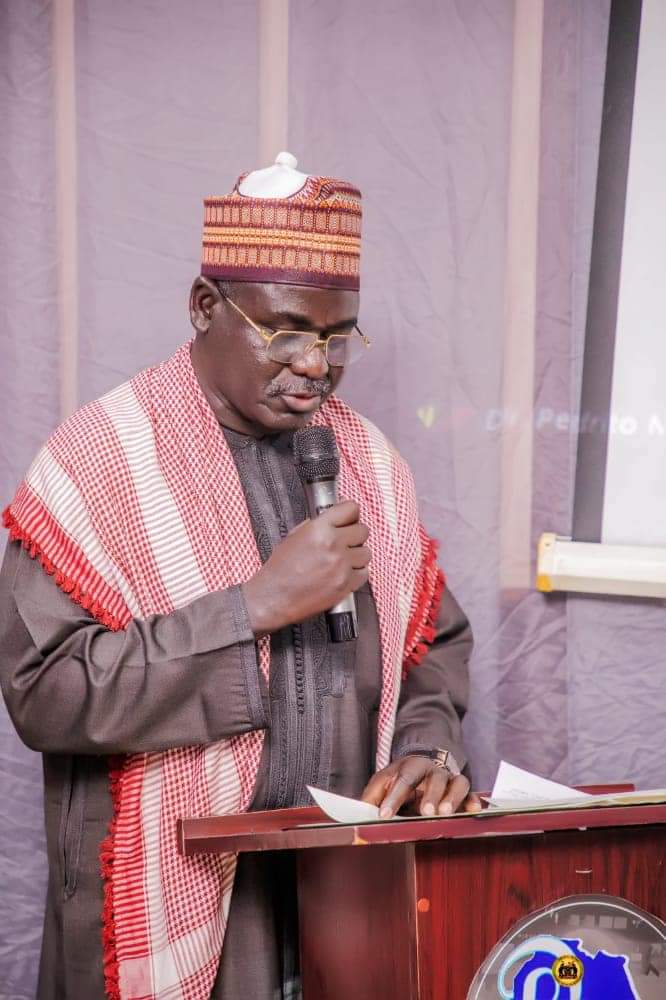
Gen. TYB And His Sense Of Nationalism
By Sunny Green Itodo
LT-Gen. Tukur Yusuf Buratai (Rtd.) is one of the finest officers Nigeria has ever produced, an illustrious example of a nationalist who by dint of hard work, patriotism and dedication to duty rose to the pinnacle of the Nigerian Army as the Chief of Army Staff.
Interestingly, TYB, as he is fondly called, was born in the year Nigeria got her independence from Britain. Not only that, he was born (24 November, 1960) into the family of a World War II veteran, Yusuf Buratai, from Buratai, now in the Biu Local Government Area of Borno State. All these are more than mere coincidences, they are pointers to what the young Buratai was to become.
The leader in him began to manifest from a very young age. He demonstrated uncommon traits of patriotism right from his primary school days in Buratai town, which he eventually took to the prestigious Government Teachers College Potiskum, Yobe State, where he was among the shining stars (he graduated with distinction).
Typical of TYB who is known for his selfless and self-sacrificing services for the common good of all, upon the completion of his teacher training, the young and brilliant Buratai settled as a classroom teacher tutoring young children at a primary school in Buratai village. And when the opportunity came for him to serve the nation on a wider front, he grabbed the opportunity and applied for the Nigerian Defence Academy, Kaduna, in 1981. And as Allah will have it, he was shortlisted for the 29 Regular Combatant Course (29 RC).
Even at the Nigerian Defence Academy, his leadership qualities were noticed and he was rewarded with the prestigious appointment of Cadet Sergeant Major (CSM). On successful completion of his Officer Cadet training, he was commissioned as a Second Lieutenant on 17 December 1983 into the Infantry Corps of the Nigerian Army.
Throughout his meritorious service to the nation as a soldier, Lt-Gen. Buratai held several positions and served in various capacities including but not limited to Administrative Officer at the State House, Abuja; Commander 2 Brigade, Port Harcourt; Commandant Nigerian Army School of Infantry, Jaji, and Force Commander of Multinational Joint Task Force (MNJTF). In addition to national and international operational deployments which include Military Observer at the United Nations Verification Mission II in Angola, Operation PULO SHIELD (Commander Sector 2 JTF), Operation HARMONY IV in the Bakassi Peninsular, MNJTF, and Operation LAFIYA DOLE, among others.
As Force Commander of the Multinational Joint Task Force (MNJTF), Buratai was saddled with the responsibility of spearheading the clearing of insurgents from the Lake Chad Basin Commission countries and the Benin Republic, which he delivered explicitly.
Before he was appointed MNJTF Force Commander, the Lake Chad Region was the epicentre of terrorism in Sub-Sahara Africa. But through his steering leadership and staunch bravery lanced with patriotism, the region recorded unequivocal success in the war against terrorism with thousands of terrorists denouncing terrorism.
Given the heroics he made at the MNJTF, President Muhammadu Buhari appointed him as Nigeria’s 20th Chief of Army Staff in 2015. He would go on to hold the revered office for a record six years.
As Chief of Army Staff, Lt-Gen. Tukur Buratai’s detribalized leadership style, patriotism and nationalist mien, dogged bravery and penchant for human rights, endeared him to Nigerians.
Nigeria recorded its biggest victory against insurgency and terrorism during his stint as Chief of Army Staff. Boko Haram, the terrorist group that has terrorized most of Northeastern Nigeria for more than a decade was defeated, and other insurgency groups such as Islamic State’s West Africa Province (ISWAP), Niger Delta militants, Bandits, militia herdsmen, Biafra secessionist militants, and other terrorists were brought to their knees.
By the time Lt-Gen. Tukur Buratai retired from the Nigerian Army in January 2021, after 40 years of meritorious service to Nigeria as a soldier and six years as Chief of Army Staff -the country’s longest-serving chief of army staff-, the Nigerian Army, and indeed Nigeria, has been better repositioned in winning wars and insurgencies.
If “Today’s planning and sacrifices are the gains of tomorrow”, like someone once said, then Buratai’s selfless and self-sacrificing strides as Chief of Army Staff have set the pace for better service delivery in the Nigerian Army.
During his days in the military, his diligence earned him a slew of on-the-job commendations including the prestigious “Pass Staff College Dagger” (psc(+)) appellation, Meritorious Service Star (MSS), Distinguished Service Star (DSS), Grand Service Star (GSS), United Nations Medal for Angolan Verification Medal II, among others.
There are three centres named after him nationwide; Tukur Buratai centre for Contemporary Security Affairs, Igbinedion University, Edo State, Tukur Buratai Institute for War and Peace, Nigerian army University Biu, and Tukur Buratai Centre for Security Studies, Ebonyi State University.
On 7th September, 2022, he commissioned two projects at the Tukur Buratai Institute for War and Peace (TBIWP), Nigerian Army University Biu (NAUB), located in Buratai town. The projects, a modern storehouse and a souvenir shop, were in honour of two staff of the institute, the late Lawan Aliyu Buratai and the late Yusuf Abubakar Miringa, the TBIWP storekeeper and his assistant.
Let me also mention that Lt-Gen Buratai has a degree in History from the University of Maiduguri and a degree in Philosophy from the Bangladesh University of Professionals, Dhaka. He is also a graduate of National Defence College, Mirpur, Bangladesh.
A true patriot, LT-Gen. Tukur Yusuf Buratai, now retired, again made himself available for national service and was appointed by Muhammadu Buhari as Nigeria’s Ambassador to the Benin Republic, just after he retired from the military.
Already, Buratai has begun to distinguish himself in the diplomatic field through his detribalized and patriotic ambassadorial services to all Nigerians in the Benin Republic.
These explained why he is loved and respected throughout Nigeria, irrespective of tribe and religion.
Recently, the people of the Buratai community in Biu Local Government Area of Borno held a reception in honour of their son, retired Lt.-Gen. Tukur Buratai, for his excellent performance as Chief of Army Staff between 2015 and 2021.
He has also received similar honours from across Nigeria. This year alone he has bagged several chieftaincy titles including the ‘Garkuwan Keffi’ conferred on him by the Keffi Emirate Council led by Emir of Keffi, Dr Shehu Chindo-Yamusa; Jagunmolu of Sakiland conferred on him by the Okere of Saki, Oba Khalid Oyedepo; Are Balogun Agba of Owu-Kuta Kingdom conferred on him by the Olowu of Kuta, Oba Adekunle Tegbosun III.
In 2020, he was conferred with the traditional title of Jarman Maradun by the Emir of Maradun, Alhaji Garba Muhammad Tambari.
Amb. LT-Gen. Tukur Yusuf Buratai (Rtd.) is the kind of leader Nigerians yearn for. His patriotism, prudence, diligence and “Nigerianism” are second to none!
cover story
2024: TETFUND’s YEAR OF POPULAR POSITIVE ATTESTATION
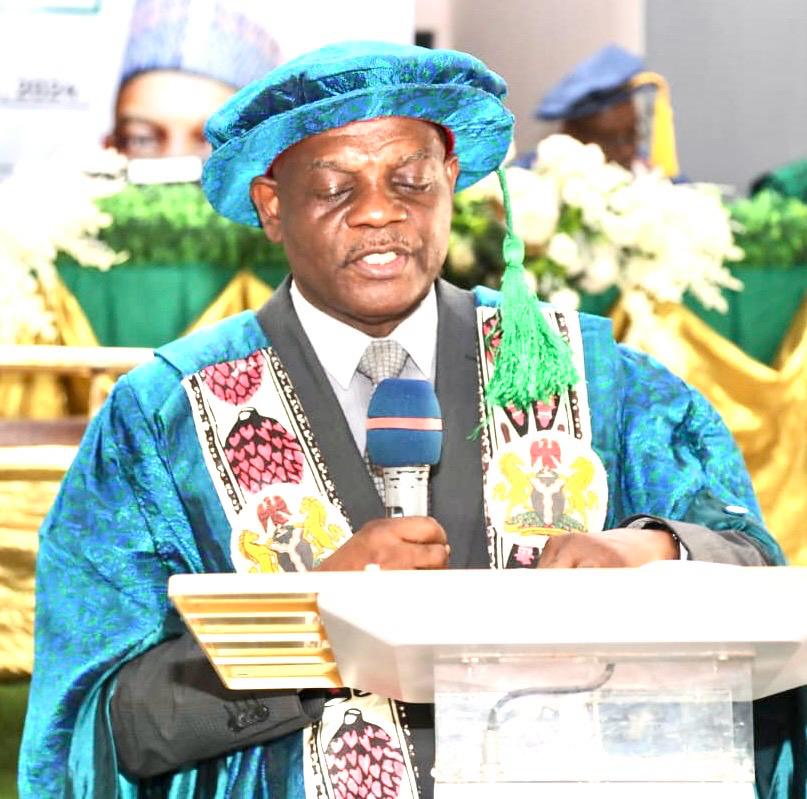
*2024: TETFUND’s YEAR OF POPULAR POSITIVE ATTESTATION*
By Tunde Oladunjoye
As a former member of the Governing Council of Tai Solarin University of Education, Ijagun, Ogun State (2016-2018), I can testify that the major projects we were able to accomplish were the projects funded by the Federal Government of Nigeria through the Tertiary Education Trust Fund (TETFUND).
TETFUND also sponsored many of the university’s staff, academic and non-academic, for continuous training abroad. For a state-owned university, which also witnessed the era of zero subvention from its owners, the state government, one could have imagined what would have been the fate of TASUED without TETFUND.
It was the same situation when I served as a Member of the Governing Council of Federal Polytechnic, Ukana, Akwa-Ibom State. All the major capital projects at the Ukanna main campus of the polytechnic were funded by TETFUND.
This is actually the reality in all the tertiary institutions in Nigeria today. TETFUND has remained the bedrock of infrastructural development for the colleges of education, polytechnics and universities owned by both the federal and state governments.
The Tertiary Education Trust Fund (TETFund) was originally established as Education Tax Fund (ETF) by the Act No. 7 of 1993 as amended by Act No. 40 of 1998 (now repealed and replaced with Tertiary Education Trust Fund (Establishment, Etc.) Act No. 16 of 2011. It is an intervention agency set up to provide supplementary support to all levels of public tertiary institutions with the main objective of using funding alongside project management for the rehabilitation, restoration and consolidation of Tertiary Education in Nigeria.
However, the reality on ground over the years and even now, is that rather than be a supplementary source of funding for the three tiers of tertiary education, TETFUND has turned out to be about the main source of funding for projects, scholarships research and development, publishing and publications.
The strategic support that the agency has provided for education in Nigeria is so effective and efficient that even the promoters of private universities have started began to lobby for accommodation by TETFUND, though unjustifiably.
The main source of income available to the Fund is the 2 percent Education Tax paid from the assessable profit of companies registered in Nigeria. However, the Tax was reviewed upwards to 2.5 percent by the Finance Act 2021 and further increased to 3 percent by the Finance Act 2023 effective September 2023.
The funds are disbursed for the general improvement of education in federal and state tertiary education institutions specifically for the provision or maintenance of essential physical infrastructure for teaching and learning, infrastructural material and equipment research and publications, academic staff training and development, and any other need which, in the opinion of the 13-member Board of Trustees, is critical and essential for the improvement and maintenance of standards in the higher educational institutions.
In 2024, the agency has impacted so significantly that testimonies abound. TETFUND has become the geese that lays the golden, so much that the Nigerian students and their lecturers do not want any harm to come near it, either in the guise of taxation, restructuring, harmonization and what have you.
At different fora and interviews in the outgoing year, the Academic Staff Union of Universities (ASUU) have warned the Federal Government against tampering with the existence of TETFUND, insisting that such a move will badly injure the Nigerian university system.
In an interview with The Guardian newspapers, the Academic Staff Union of Universities (ASUU) cautioned the Federal Government against phasing out the Tertiary Education Trust Fund (TETFund) in favour of the newly introduced Nigerian Education Loan Fund (NELFUND), warning that such a move could severely damage Nigeria’s public university system.
“TETFund has been instrumental in transforming tertiary education across Nigeria for over 30 years. Scrapping it would devastate public universities and deny access to education for children from low-income families,” said ASUU President, Prof. Emmanuel Osodeke, during the interview with The Guardian.
According to Osodeke: “TETFund is the product of our struggle as educators. The government cannot unilaterally decide to dismantle it without engaging those who understand its importance,” Osodeke emphasised.
ASUU proposed that the government explore alternative funding mechanisms for NELFUND, such as allocating a percentage of Value Added Tax (VAT), rather than repurposing TETFund’s consolidated revenue from corporate taxes: “We are not opposed to NELFUND. But the government must find a new source of funding without dismantling the existing framework that has sustained our universities,” Osodeke added.
He highlighted the significant role TETFund plays in providing infrastructure and academic development in public institutions, noting that 90% of physical structures in universities, polytechnics, and colleges of education are products of TETFund.”
ASUU urged the government to uphold the legacy of TETFund, which has inspired similar initiatives like Ghana’s Education Trust Fund (GETFund).
“Countries in Africa are learning from TETFund. Scrapping it now would be a step backward for Nigeria,” Osodeke stressed, appealing to the government to prioritize education funding in line with global standards.
For the avoidance of doubt, the ASUU President affirmed categorically that: “This is not just about ASUU; it’s about the survival of Nigeria’s education system and the opportunities it provides for millions.”
He who wears the shoe, they say, knows where it pinches. It was, therefore, not surprising when the umbrella body for university students in Nigeria, the National Association of Nigerian Students (NANS) joined ASUU to mobilize against any attempt to scrap or reduce revenue accruable to TETFUND.
NANS, at a well-attended event in Lagos, called on the Federal Government for more clarification on the matter. The student body made its position known at the 86th National Senate Sitting and Pre-Convention event held at the Lagos State University (LASU), Ojo. Over 5,000 student leaders from various levels (national, geo-political zones, states, and campuses) across Nigeria attended the event.
The Senate President of NANS, Babatunde Afeez Akinteye, according to The Nigerian Tribune, urged the Federal Government to be transparent about its future plans for TETFUND in the Tax Reform Bills. He emphasized the need to clarify whether the proposed tax reform would negatively affect the agency.
“Every Nigerian recognizes the importance of TETFUND in our educational institutions. Its projects are evident across campuses. Without TETFUND, we cannot imagine what would have become of our campuses.
The agency’s contributions go beyond infrastructural development to include capacity building, research, and innovative activities. For these reasons, TETFUND must not be tampered with but instead properly funded and managed by competent individuals of integrity to ensure even greater performance,” he said.
Not long after, with the opposition against alleged aim of scraping of TETFUND becoming louder and louder, the Federal Government had to come out to dispel the rumours being peddled that there were plans to scrap TETFUND.
Mr. Bayo Onanuga, the presidential spokesman, dispelled the rumour, saying there was no such plan to scrap TETFUND and a few other agencies in the proposed tax bill.
“No part of the tax reform bills currently before the National Assembly (NASS) recommends the scrapping of Tertiary Education Fund (TETFund), National Agency for Science and Engineering Infrastructure (NASENI) and National Information Technology Development Agency (NITDA)”, the Presidency through Onanuga said in a statement.
“Contrary to the lies being peddled, the bills do not suggest that NASENI, TETFUND, and NITDA will cease to exist in 2029 after the passage of the bills. Government agencies, such as NASENI, TETFUND, and NITDA, are funded through budgetary provisions with company income tax and other taxes paid by the same businesses that are being overburdened with the special taxes.”
As the clarification from the Federal Government seemed to have put the mind of the concerned public at rest, desperate people embarked on campaign of calumny against TETFUND and its Executive Secretary, Architect Sonny Echono, who had taken the Fund commendably to greater heights locally and internationally, since he took over the affairs of the agency. The published attacks and lies against TETFUND and its helmsman, mostly on back street social media were born out of envy and mindless hustling of certain people who wanted to wrestle the steering of TETFUND for their ulterior, self-serving and unpatriotic motives.
It is, however, highly commendable that TETFUND and its management continue to remain focused, undistracted in the delivery of their mandate, with the active support of its Board Members picked across the six geopolitical zones of the country and chaired by the former Governor of Kastina State, Rt. Hon. Aminu Masari.
As part of efforts towards revamping the Nigerian economy through promotion and investments in groundbreaking research and innovations, the maiden edition of the National Research Fair/Exhibition has been successfully held in Abuja with innovators, researchers and inventors on the ground to showcase various innovative projects.
The five-day event, which was held between 17th and 21st November 2024, not doubt, lived up to its billings.
The fair represented a significant landmark in TETFund’s quest for promotion of groundbreaking research and innovations and provided an opportunity for researchers and inventors to display local solutions capable of supporting national development.
Speaking at the opening ceremony of the event held at the Eagle Square, the Honourable Minister of Education, Dr. Maruf Alausa, stated that only impactful research and innovation could equip Nigeria with needed elements to transform its fortune, adding that the Federal Government is committed to leveraging research and for economic growth.
He stated that despite being the first of its kind, the TETFUND fair would be held annually to unleash the innate capacities of millions of young Nigerians by giving them opportunities to contribute to economic development through innovation.
The Executive Secretary of TETFund, Arc. Sonny Echono stated that the exhibition was aimed at “showcasing research outcomes from the Fund’s Beneficiary Institutions, as well as other innovations both from the formal and informal sectors with the aim of connecting them to industry for prototype upscale and commercialization.”
He added that the exhibition was also an effort by the Fund to ensure innovators and researchers contribute their quota to revamping the country’s economy, create jobs, as well as generate and redistribute wealth among Nigerians.
In his own remarks at the event, the Chairman, Board of Trustees of TETFund, Rt. Hon. Aminu Masari, reiterated the commitment of the TETFund Board to research development in tertiary institutions, adding that the paucity of funds required for promoting cutting-edge research that are crucial to national development will be significantly addressed under his leadership.
It is hoped that the Federal Government will strengthen TETFUND and not whittle down its powers, influence or resources under any guise even as the Architect Sonny Echono-led management continues its giant, positive strides.
*Tunde Oladunjoye, a journalist, was at various times a Member of the Governing Councils of Tai. Solarin University of Education, Ijagun, Ogun State and Federal Polytechnic, Ukanna,Akwa-Ibom State; sent this via [email protected]*
cover story
Echono to deliver FUTO’s 36th Convocation Lecture
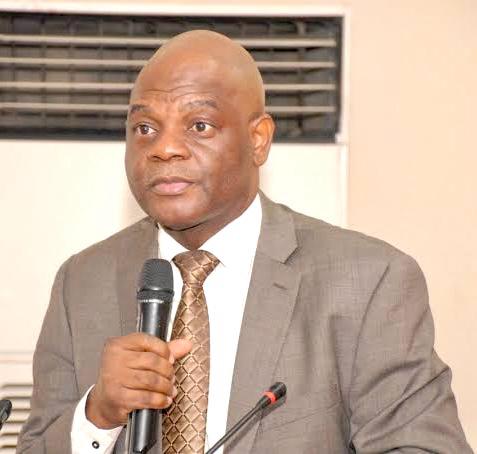
Echono to deliver FUTO’s 36th Convocation Lecture
The Executive Secretary of Tertiary Education Trust Fund (TETFUND) Arch. Sunday Silver Echono, will on Thursday, December 5th, 2024 deliver the 36th Convocation Lecture of the Federal University of Technology (FUTO), Owerri.
The lecture titled “Impact of Leadership Selection on Governance in Public Universities in Nigeria” will hold at Prof. C.O.E. Onwuliri Conference Hall, FUTO main campus, Owerri.
The University’s Vice Chancellor, Prof. (Mrs). Nnenna Oti, will be the Chief Host at the lecture, which is expected to attract participants from within and outside the university community, especially the academia.
FUTO is the oldest university of technology in Nigeria, established in 1980 by Nigeria’s first Executive President, Shehu Shagari. It became the first of three such universities set up by the Federal Government of Nigeria, which sought to establish a University of Technology in each geo-political region, particularly in a state which did not have a conventional university.
Arc.Sunday Sylva Togo Echono OON is a Nigerian diplomat, and architect who serves as the ninth Executive Secretary of Tertiary Education Trust Fund from 2022 till-date. Previously, Echono served as the Secretary of the Admissions Committee of the Nigerian Institute of Architects and the 28th President of the Nigerian Institute of Architects from 2019 to 2021.
Sonny Echono was nominated by the Board of TETFUND in early 2022 and was subsequently appointed as the substantive 9th Executive Secretary (ES) of TETFUND on March 18, 2022, by former President Muhammad Buhari.
A former permanent secretary in federal ministries, Echono had been honoured by governmental and non-governmental bodies locally and internationally. He is a recipient of Officer of Order of Niger (OON).
cover story
LAUTECH Emerges Qualifier at NOA Southwest National Values Debate
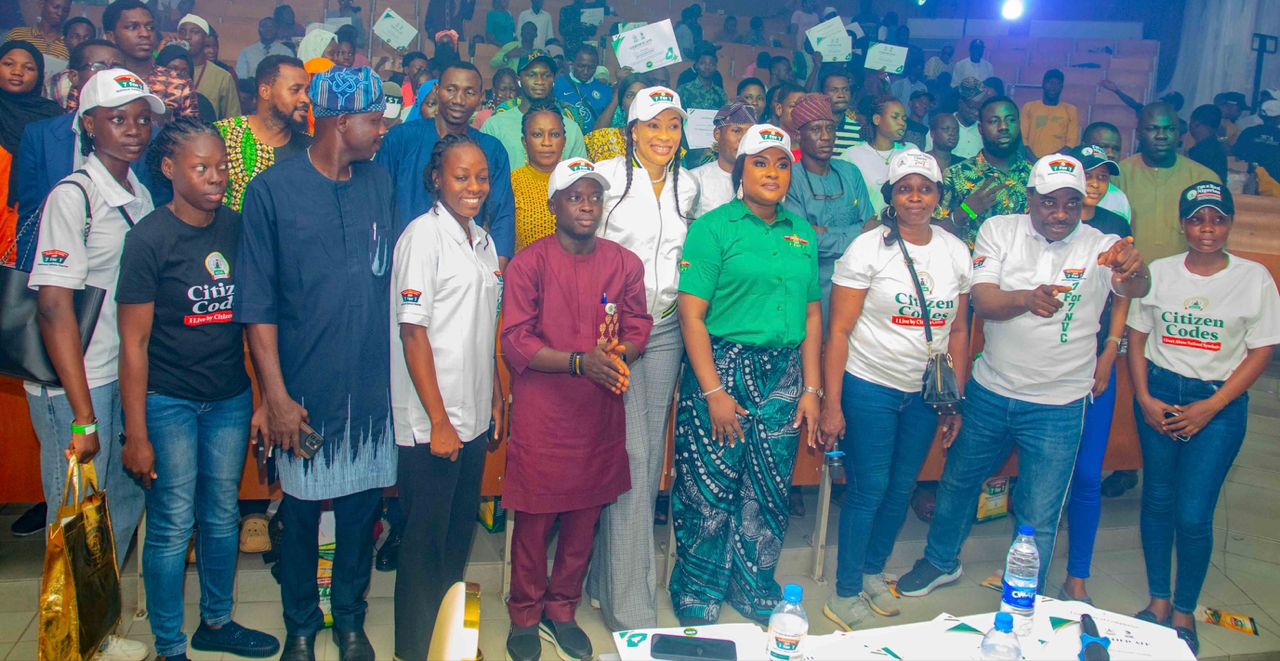
LAUTECH Emerges Qualifier at NOA Southwest National Values Debate
In a thrilling display of intellect and oratory, Ladoke Akintola University of Technology (LAUTECH) has been crowned the Southwest champion at the 7 for 7 National Values Charter Campus Debate and Capacity Building Conference. The event, organized by the National Orientation Agency (NOA) and held at the Julius Berger Hall of the University of Lagos, aimed to inspire a culture of national values and civic responsibility among Nigerian youth.
The competition culminated in a gripping debate between LAUTECH, represented by Adekunle Ayomide and Oladeji Olushina, and the University of Ibadan, represented by Oyedijo Olarenwaju and Chineke Ugochukwu. The teams dissected the topic, “7 for 7 National Values Charter: Striking the Balance Between Government Promises and Citizens’ Responsibilities in Nation-Building,” presenting compelling arguments that explored the intricate interplay between governance and civic duty.
LAUTECH’s Adekunle Ayomide impressed with his calm yet authoritative delivery, while Oladeji Olushina’s vivid examples underscored the importance of shared responsibility. Their counterparts from the University of Ibadan countered with historical insights and pragmatic solutions, making the contest a true battle of wits.
After intense deliberations, the judges awarded LAUTECH the southwest championship title, earning them a ₦5,000,000 prize and a ticket to the grand finale, where they will compete for the ultimate ₦20,000,000 prize.
The event was more than a competition. A capacity-building segment led by distinguished facilitators offered invaluable insights to attendees. Oluseye Taiwo Adepoju, renowned as “The Oracle” and a Gallup-Certified Strengths Coach, delivered a session on leadership and personal development, encouraging participants to harness their unique strengths for societal impact.
Dr. Leonard Okonkwo, a Consultant Clinical Psychologist, engaged the audience with an exploration of human behavior and its role in national progress. Through practical exercises and anecdotes, he emphasized the need for mental and emotional resilience in achieving personal and societal goals.
Tolu Meduna, the program coordinator, articulated the essence of the initiative: “Our goal is to raise Citizen Values Brigadiers—youths who will champion the ethos of unity, accountability, and resilience. This is how we build a stronger Nigeria.” Meduna also outlined the event’s national scope, noting that the debate series will span all six geopolitical zones of the country, with the ultimate winner determined by online viewers at a live broadcast event.
The conference attracted notable dignitaries, including Hon. Moruf Akinderu Fatai, Lagos State Commissioner for Housing; Hon. Opeyemi Alabi, Senior Special Assistant to the Lagos State Governor on Youth Mobilization; and Izehi Semira, Founder of Shape A Child Initiative. Hon. Fatai lauded the initiative, stating, “This aligns perfectly with our collective mission to create a Nigeria where values drive progress.”
As the curtains fell, the 7 for 7 National Values Charter left an indelible mark on participants. Beyond the awards and accolades, the initiative ignited a renewed commitment to unity, accountability, and national development. All attendees received Citizen Values Brigade certificates, symbolizing their role as ambassadors of change. The National Identity Project is championed by the director general of the National Orientation Agency, Mallam Lanre Issa Onilu.
For LAUTECH, the journey to the national grand finale promises new challenges and opportunities. For the nation, the message was clear: embracing shared values and responsibilities is the path to a brighter future.
The value train continues its journey, uniting hearts and minds in a shared vision of progress and national pride.
-

 celebrity radar - gossips6 months ago
celebrity radar - gossips6 months agoWhy Babangida’s Hilltop Home Became Nigeria’s Political “Mecca”
-

 society6 months ago
society6 months agoPower is a Loan, Not a Possession: The Sacred Duty of Planting People
-

 society5 months ago
society5 months agoReligion: Africa’s Oldest Weapon of Enslavement and the Forgotten Truth
-

 news6 months ago
news6 months agoTHE APPOINTMENT OF WASIU AYINDE BY THE FEDERAL GOVERNMENT AS AN AMBASSADOR SOUNDS EMBARRASSING

